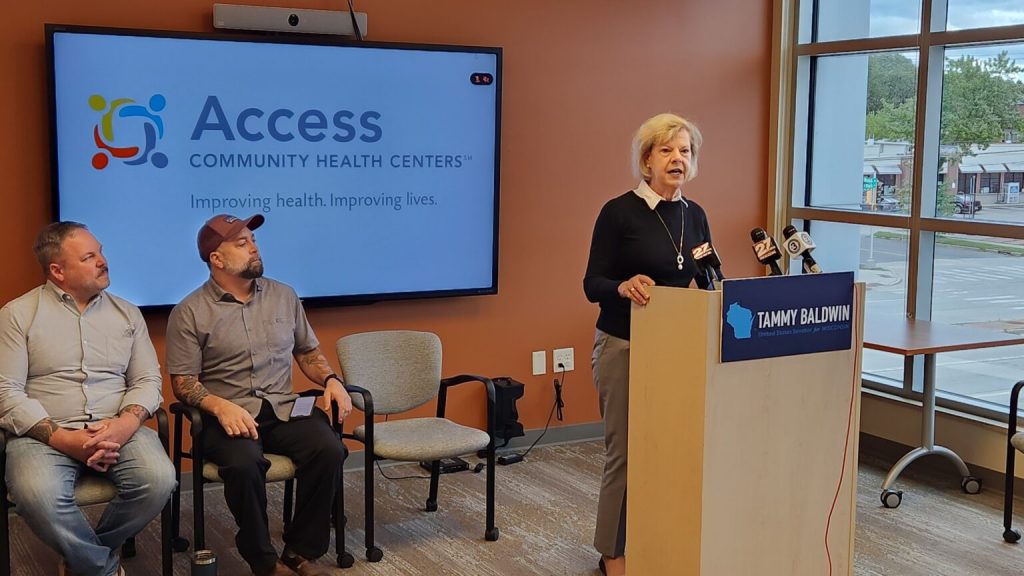Baldwin Bill Extends Tax Credits to Cut ACA Health Insurance Costs
Wisconsin senator says some Senate Republicans 'quietly support' proposal.

Sen. Tammy Baldwin (D-Wis.) speaks Friday at a press conference to promote her legislation that would extend enhanced tax breaks on the cost of insurance purchased through the Affordable Care Act. Business owners Kyle LaFond, left, and Evan Dannells also spoke in favor of extending the tax credits. (Photo by Erik Gunn/Wisconsin Examiner)
Federal legislation that would hold down the cost of health insurance for millions of Americans and nearly a quarter-million Wisconsin residents has quiet support from Republicans in the Senate, according to Sen. Tammy Baldwin (D-Wisconsin).
So far, however, none of them have spoken out, Baldwin said at a news conference in Madison on Friday.
Baldwin has introduced a bill that would extend tax credits that have cut the health insurance costs for people who buy coverage on the federal marketplace, HealthCare.gov.
When the Affordable Care Act (ACA) was enacted in 2010 and the HealthCare.gov marketplace was launched to make it easier and cheaper for people without health insurance to buy coverage, the law included tax credits to lower the cost of premiums for people with incomes up to 400% of the federal poverty guideline.
In 2021, the premium tax credits were supercharged to impart far greater savings to people buying insurance through the marketplace. The enhanced tax credits were extended in 2022 with a sunset at the end of this year.
The extra tax breaks helped insurance coverage through the HealthCare.gov marketplace rise to record highs in the last few years, both in the U.S. and in Wisconsin.
“This tax break, the enhanced premium tax credit, saves more than 230,000 Wisconsinites an average of $500 every single month” on their insurance premiums, Baldwin said. “Not extending these tax breaks and jacking up costs on the open marketplace will crush families — but also small businesses that are the fabric of our communities.”
In January Baldwin and New Hampshire Sen. Jeanne Shaheen (D-N.H.) introduced legislation to make the enhanced tax credits permanent, in place of the lower tax credits that will resume when the enhanced credits expire Dec. 31.
A paper published Sept. 3 by the Georgetown University Law School Center on Poverty and Inequality reported that according to the Congressional Budget Office, without the enhanced credits 30 million more people will lack health insurance by 2034 — an average of 3.8 million a year.
For people with incomes between 100% and 150% of the federal poverty guideline, insurance premiums will go up by 7.9% between 2026 and 2034, the Georgetown researchers calculated.
For people with incomes between 150% and 400% of the federal poverty guideline, premiums would rise between 29% and 160% in the same period, according to the report.
The report also notes without the enhanced tax credits, people who lose Medicaid coverage due to cuts in the Republican megabill President Donald Trump signed on July 4 could be unable to afford insurance on HealthCare.gov.
‘Encouraged by conversations’
“There are, in the Senate, Republicans who have quietly indicated that they want to extend breaks to make [HealthCare.gov] marketplace insurance affordable,” Baldwin said. “I don’t have a count yet to tell you that we have enough, but I’m encouraged by the conversations I’m having.”
In the U.S. House, a bipartisan bill has been introduced extending the enhanced credits for a year — “notably getting them past the midterm elections,” Baldwin said. But that’s not long enough for her.
“I don’t think this should be political,” Baldwin said. “I think this should be something that Democrats and Republicans should agree on, that people should be able to afford their health care coverage.”
Baldwin’s press conference was held at Access Community Health Center, which serves low-income Wisconsin residents. Joining Baldwin, Madison chef and restaurant owner Evan Dannells said that the passage of the ACA and the opening of the HealthCare.gov marketplace made health care newly available in his industry after years of the youngest group of workers going uninsured.
Before the ACA, for people who entered hospitality jobs in their late teens or early 20s, “it was essentially, fundamentally understood that you wouldn’t have health care until you were in your 30s,” Dannells said.
The ACA required insurers to cover young people on their parents’ plans up to the age of 26, then made it possible for them to find more affordable coverage at HealthCare.gov after that.
“I have a half dozen full time employees over the age of 26 at a restaurant, and so what they’re going to do is they’re going to leave for corporate jobs that have the buying power to get their premiums down,” Dannells said — something not possible for small employers.
“This is essentially the beginning of the dismantlement of the Affordable Care Act with no plan and process for the future,” Dannells said.
Kyle LaFond, owner of a Middleton manufacturing firm that makes custom cosmetic products for celebrity brands, said the ACA and the HealthCare.gov was “a godsend” for small employers such as his company. “These subsidies are important because, of course, now more than ever, folks are living paycheck to paycheck,” he said.
Baldwin said she will campaign to attach her proposal to one of “several must-pass bills coming up in the days and the weeks ahead.”
Avoiding the ‘cliff’
While the enhancements increased the value of the tax credits for people with incomes up to 400% of the poverty guideline, they also made tax credits available for the first time to people with higher incomes — up to more than 1000% of the guideline.
Baldwin told the Wisconsin Examiner that those higher income groups were added to avoid “what we call a cliff.” That occurs when a person’s income rises even slightly above a benefit’s income ceiling — suddenly cutting off the benefit and possibly demanding they make a repayment. Many safety-net programs have cliffs, she explained.
In Wisconsin, most Medicaid programs have income limits, and many are only available to people with incomes up to the federal poverty guideline, she said. People who may work several part-time jobs and usually qualify for Medicaid can find themselves kicked off the program if they have a brief boost in their income, due to overtime work, for instance.
“Then you have to do all sorts of work to get back on, and then you have to be very mindful that you don’t get an extra hour or a raise” that could lead to being kicked off again, Baldwin said.
“So we were trying to avoid there being the sort of equivalent cliff in the Affordable Care Act marketplace tax credits,” Baldwin said.
For that reason, her bill would continue the tax credits available to the higher income population, she said, “and I would be committed to not reintroducing a cliff.”
Baldwin criticized GOP lawmakers for passing the Republican megabill that extended Trump’s 2017 tax cuts without considering an extension of the enhanced ACA credits.
“You would think including tax breaks for tens of millions of families to afford health care would be a centerpiece of that legislation. Right? Wrong,” Baldwin said.
Instead, she charged, the bill made cuts to Medicaid and the federal nutrition program SNAP to pay for tax cuts “in favor of the biggest corporations and the wealthiest Americans.”
Baldwin legislation would extend tax credits that cut Affordable Care Act insurance costs was originally published by the Wisconsin Examiner.
If you think stories like this are important, become a member of Urban Milwaukee and help support real, independent journalism. Plus you get some cool added benefits.





















